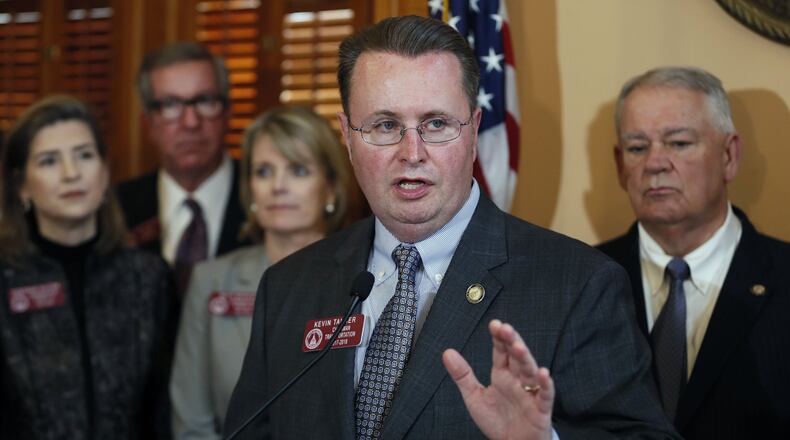State legislation unveiled Tuesday could boost state funding for public transportation by tens of millions of dollars and pave the way for transit expansion across metro Atlanta.
House Bill 930 also would begin to create the sort of regional transit system that lawmakers say is needed to spur economic development and alleviate some of the world's worst traffic.
Some big questions – including exactly how much money Georgia would invest in transit – remain unanswered. And opposition to a regional transit system is already emerging.
But with metro Atlanta adding about 100,000 new residents a year, House Speaker David Ralston urged the General Assembly to pass sweeping transit legislation this year, instead of kicking the can down the road as it has in the past.
“Georgia’s speed of change will not allow us to wait many more ‘next years,’” the speaker said Tuesday at a press conference announcing the legislation.
Tuesday’s announcement is the latest evidence of an extraordinary change in the perception of mass transit among the Georgia lawmakers. Five years ago – with MARTA’s reputation in tatters and anti-transit sentiment flourishing in the suburbs – the prospects for more state funding would have seemed laughable.
But MARTA’s financial position and reputation have improved dramatically. And economic development concerns – including the courtship of companies like Amazon, which want transit access – have sold many lawmakers on the importance of public transportation.
With the introduction of HB 930, there are now two bills that seek to revamp transit oversight and funding in metro Atlanta. The Senate is considering similar legislation.
Both bills would create a new regional board to oversee transit planning in 13 metro Atlanta counties: Cherokee, Clayton, Coweta, Cobb, DeKalb, Douglas, Fayette, Forsyth, Fulton, Gwinnett, Henry, Paulding and Rockdale.
The bills would allow the counties to impose sales taxes for transit projects, if their voters approve them. The regional board would have to approve the project lists for any county transit referendum. But the taxes raised in any county would be spent only in that county.
House Transportation Committee Chairman Kevin Tanner said a coordinated approach to transit is needed to address the region's traffic problem.
“We can’t continue to address it in silos,” he said.
HB 930 also would:
*Allow Fulton County (outside Atlanta) to impose a quarter-cent sales tax for transit projects, if voters approve it. The county is finalizing a transit plan that could result in a voter referendum. In 2016 county voters approved a .75 percent sales tax for road improvements.
*Allow the Cobb County Board of Commissioners to create a new transportation district in the Cumberland Community Improvement District area. The district could impose a 1 percent transit tax, if voters in the area approve it. The tax would not be imposed on the rest of the county.
*Impose a 1 percent tax on consumer goods sold at Hartsfield-Jackson International Airport and at Savannah/Hilton Head International Airport. The proceeds of the taxes would be dedicated to transit projects in the respective regions.
*Impose a 50-cent fee on all taxi and ride-hailing service trips. The money would also be dedicated to transit projects.
Tanner, a Dawsonville Republican, said the airport tax and ground transportation fee would raise about $40 million annually for transit projects. The state currently spends about $14.5 million annually on transit, most of it for commuter bus service in metro Atlanta. Georgia ranks 27th among the 50 states in spending on public transportation.
The state may spend significantly more on mass transit. Ralston said lawmakers are negotiating a bond package that could be dedicated to transit construction. He did not reveal the size of the package.
It's also unclear how quickly counties could go to the polls with transit referendums.Fulton and Gwinnett counties have considered asking voters to approve transit taxes as soon as this November. But as the bill is written, the regional board that must approve project lists would not be established until next January.
Still, a bipartisan group of lawmakers endorsed the legislation Tuesday. And it won quick acclaim from some transit supporters.
Atlanta Regional Commission Chairman Kerry Armstrong praised lawmakers, saying a regional transit network is essential to address economic development and traffic congestion.
Not everyone is on board. Last week the Fayette County Board of Commissioners approved a resolution asking to be exempt from any regional transit plan.
Commissioner Steve Brown, who sponsored the measure, said transit does not make sense for his county of 110,000. He doesn’t think it makes sense even for much larger counties.
Despite assurances from lawmakers, Brown is suspicious that Fayette taxpayers will end up paying for transit services they don’t want and are a waste of money anyway.
“You’re probably looking, long term, at some of the largest tax increases we’ve ever seen (for transit),” Brown said.
Still, other local officials welcomed the House bill. Gwinnett County Chairwoman Charlotte Nash said lawmakers have an historic opportunity to tackle an issue that has vexed Georgia and metro Atlanta for decades.
“We have all the state leadership talking about transit,” Nash said at Tuesday’s press conference. “That was unheard of in the past.”
About the Author
Keep Reading
The Latest
Featured


